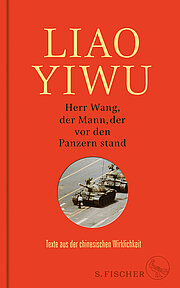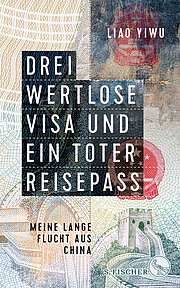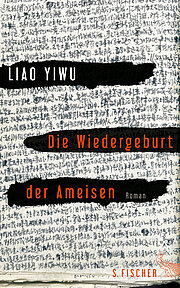The Board of Trustees of the Peace Prize of the German Publishers and Booksellers Association has chosen Chinese author Liao Yiwu to be the recipient of this years Peace Prize. The award ceremony took place on Sunday, October 14, 2012 in the Church of St. Paul in Frankfurt am Main. The laudatory speech was held by Felicitas von Lovenberg.
Statement of the Jury
The German Publishers and Booksellers Association is awarding its 2012 Peace Prize to Liao Yiwu. In doing so, the association and its members have chosen to honor a Chinese author who continues to wage an eloquent and fearless battle against political repression and who lends a clear and unmistakable voice to the downtrodden and disenfranchised of his country.
In his prose and poetry, Liao Yiwu erects an evocative literary monument to those people living on the margins of Chinese society. The author, who has experienced first-hand the effects of prison, torture and repression, is an unwavering chronicler and observer who bears witness on behalf of the outcasts of modern China.
The manuscript of his work “For a Song and a Hundred Songs,” in which he tells of the brute force and dehumanizing conditions in Chinese prisons, was confiscated repeatedly by authorities. In response, he rewrote it several times and was eventually able to publish it in exile. As a Volksschriftsteller (“people’s author”) in the most comprehensive sense of the term, Liao Yiwu is an unrelenting advocate of human dignity, freedom and democracy.
Speeches
He is someone who has unflinchingly and eloquently given voice to those among his people who suffer repression and oppression.
Gottfried Honnefelder - Greeting
Gottfried Honnefelder
Greeting of the president
Liao Yiwu embodies a resistance performed by heart. Indeed, it is based “on a terror located at a deeper level than the long confinement and the physical agony”.
Felicitas von Lovenberg - Laudation for Liao Yiwu
Felicitas von Lovenberg
Laudation for Liao Yiwu
But here, today, I would like to announce the news of another death – that of the Chinese empire. A country that massacres little children must break apart – that is in keeping with the Chinese tradition.
Liao Yiwu - Acceptance speech
Liao Yiwu
Acceptance speech
Chronicle of the Year 2012
+ + + Syria is in civil war. + + + As a result of a credit and media scandal, the German Federal President Christian Wulff resigns from the Position. + + + Election of Joachim Gauck as 11th President of the Federal Republic of Germany. + + + 355 prisoners die in a prison fire in the Honduran city of Ciudad de Comayagua. + + +
+ + + After the uncovering of the attacks of the right-wing extremist terrorist group NSU and the discovery of various investigation mishaps, fundamental discussions about the work of the Verfassungsschutz (Office for the Protection of the Constitution) are taking place in Germany. + + + In Greece, Spain and Italy, citizens are protesting against the crisis policy of the European Union and against the policies of their own governments. + + + South African miners' strike + + + Presidential elections in the US: Democratic incumbent Barack Obama defeats his Republican challenger Mitt Romney. + + + A military operation by Israeli forces begins in Gaza. + + ++ In Egypt, an Islamic-influenced constitution is adopted in a referendum under continuing protests. + + + More than 70 people are killed and around 300 injured in a hostage-taking attack on a shopping centre in the Kenyan capital Nairobi. + + +
Biography of Liao Yiwu
Liao Yiwu was born on August 4, 1958 in Chengdu, the capital of the Chinese province of Sichuan. That year also saw the launch of The Great Leap Forward, an economic and social campaign that lead to widespread famine and the death of over 36 million Chinese. Liao Yiwu’s father was a university professor who taught his son to read and recite classical poetry and prose at the age of three. In 1966, his father was branded a counterrevolutionary and his parents chose to divorce in order to protect their children. Liao Yiwu lived thereafter with his mother and siblings in great poverty.
After a difficult childhood on the streets without the opportunity to attend school on a regular basis, Liao Yiwu eventually went on to work as a kitchen hand and a truck driver. He soon began reading Western literature in Chinese translation, a pursuit that increased his interest in a literary career. At this point he also began writing his own poetry. Liao Yiwu tried unsuccessfully to enter university over the course of the four years that followed the death of Mao Zedong, the fall of the so-called “Gang of Four” and the end of the Chinese Cultural Revolution. Instead, he found work at a newspaper, where his talent as a writer and poet was immediately recognized and soon lead to his acceptance and promotion by the Ministry of Culture as an “author of the people.”
During the 1980s, Liao Yiwu regularly published poems in official Chinese literary magazines. He published his other, Western-style poems in underground anthologies and periodicals as they were considered “intellectual pollution” by Chinese officials. In 1987, these underground poems prompted Chinese officials to place him on their official black list. In 1989, after the publication of two of his poems, “The Yellow City” and “Hero” – both of which depicted China’s paralyzed system allegorically as a collective leukemia in which Chairman Mao was a symptom of the disease – his apartment was searched and he was brought in several times for interrogation.
Liao Yiwu wrote the poem “Massacre” in response to the unrest spreading throughout China during the mass demonstrations on Tiananmen Square. In this poem, which he composed on the eve of the Chinese army’s brutal crackdown against protesters, he anticipated precisely the events that would take place the following day, June 4, 1989. Because he saw no possibility of publishing his poem, he recorded it that very same day on cassette and distributed copies throughout the country. After that, Liao Yiwu worked on a film thematizing the events on Tiananmen Square under the title “Requiem.” In February 1990, he, his film crew and his pregnant wife were arrested. He was sentenced to four years in prison for “disseminating counterrevolutionary propaganda.”While in prison, Liao Yiwu repeatedly defied prison rules and rebelled against prison guards, actions for which he was punished heavily. Years later, he would go on to write about the rules and punishment rituals of the inmates – who were organized in a severely hierarchical manner – and also to chronicle various diseases, torture and his own two suicide attempts.
In 1994, Liao Yiwu was released from prison almost fifty days before his sentence was set to expire. The official reason given for this early discharge was “good behavior,” but it was no doubt heavily influenced by international pressure.Liao Yiwu’s incarceration and experiences in the four prisons in which he served his sentences effectively tore him out of his previous existence. As an “unemployed person” he his residency permit revoked, his wife and their daughter left him, and his friends and fellow writers kept their distance. Liao Yiwu had learned to play the flute in prison and with this instrument – his only possession – he worked as a street musician and as a casual laborer in restaurants, tea houses and bookstores. During this period, he was under constant supervision by the police.
In 1998, Liao Yiwu put together an anthology of underground poems written by numerous Chinese dissidents from the 1970s under the title “Der Untergang des heiligen Tempels” (“The Fall of the Holy Temple”). Chinese authorities immediately called for an inquest and labeled the book a “deliberate attempt to overthrow the government.” Liao Yiwu was imprisoned once again and his publisher received a one-year publication ban.In 1998, Liao Yiwu assembled a collection of 60 interviews, each representing an encounter with a fellow prisoner or someone he had met while working as a street musician and casual laborer. This collection was published in an expurgated form by a Chinese publisher in 2001 under the title “Interviews with People from the Bottom Rung of Society.” In 2009, this “collection of curious biographies – an authentic cultural history of China from Mao to the present” (Herta Müller) was published in its unabridged form in Germany under the title “Fräulein Hallo und der Bauernkaiser: Chinas Gesellschaft von unten.” His conversations, which included interviews with a murderer, a professional mourner, a thief, a bathroom attendant, a human trafficker, a soothsayer, a homosexual, a beggar, a teacher, a dissident, a former noblemen, a pimp, a Feng Shui master and many other people drawn from society’s lowest strata, serve to outline the reality of contemporary China. This work thus became a portrait of the country far beyond those provided by official representations.
The expurgated Chinese version of the book received much critical praise and sold very well – that is until Chinese authorities prohibited its sale, punished the publisher and caused the dismissal of employees at a Chinese newspaper that conducted an interview with Liao Yiwu. From then on, it was prohibited to even mention his name in any form of media. In 2002, his book was smuggled to Taiwan where it was published one year later in three volumes. Excerpts from the book soon appeared in English and French. In 2003, Liao Yiwu received the Hellman Hammet Grant, an award handed out by Human Rights Watch. In 2007, he was awarded the Freedom to Write Award from the Independent Chinese PEN Center. However, officials did not permit the presentation ceremony to take place. In 2008, 27 of Liao Yiwu’s “conversations” were published in the USA under the title “The Corpse Walker – Real Life Stories: China from the Bottom Up.” In 2012, he was awarded the Ryszard Kapuscinski Prize for the Polish edition of the book.
In “Chronicles of the Big Earthquake,” which appeared in 2009 in Hong Kong, Liao Yiwu published a series of interviews he had conducted with people who had survived the major earthquake in the Sichuan region in 2008. That natural disaster had caused over 80,000 deaths, and Liao Yiwu’s book gave a voice to survivors who were calling for justice after witnessing rampant corruption. After many unsuccessful attempts, Liao Yiwu was finally able to acquire a passport. In October 2009, he was nevertheless denied permission to travel to the Frankfurt Book Fair, at which China was the guest country. He was also not permitted to participate in the lit.cologne literary festival in Cologne in spring 2010 and instead was arrested and interrogated for hours at the airport in China. An open call to German Chancellor Merkel eventually allowed him to leave the country for the first time in September to take part in the Berlin International Literary Festival. After he was once again denied permission to leave China in early 2011, Liao Yiwu decided to make his way to Germany via Vietnam in July of that year.
In order to protect Liao Yiwu’s life, his German publisher waited to release “Für ein Lied und hundert Lieder” (“For a Song and a Hundred Songs”) until the author had successfully fled his homeland. This book is the translation of the third version of recollections from his four-year imprisonment from 1990 to 1994. He was forced to write it over several times after his manuscripts were confiscated in 1995 and 1997. His description of persecution in various Chinese prisons and work camps is prefaced by the sheer force of his poem “Massacre,” which was the cause of his imprisonment in the first place. The book, which received the Geschwister Scholl Prize in November 2011, thus became a “first-class political testimonial” (Neue Zürcher Zeitung), with which Liao Yiwu gives voice to a group of people whom the political system sought to silence. That same year saw the publication in Germany of a collection of as yet unpublished poems under the title “Massacre: Early Poems.”
In 2012, Liao Yiwu received a one-year stipend from the DAAD’s Berlin Artists Program. From his base in the German capital, he is now working to draw public attention to the plight of his friend, the Chinese underground poet and writer Li Bifeng, who has been imprisoned for months and who is facing conviction for so-called “economic crimes.” On October 14, 2012, Liao Yiwu will be honored with the Peace Prize of the German Book Trade. At the end of 2012, his new book “Die Kugel und das Opium – Leben und Tod am Platz des Himmlischen Friedens” will be published in Germany.
Awards
2013 Aschaffenburger Mutig-Preis
2012 Friedenspreis des Deutschen Buchhandels
2011 Geschwister-Scholl-Preis
2011 Hörspiel des Jahres
2007 Freedom to Write Award des unabhängigen PEN-Zentrums China
2003 Hellman-Hammet-Grant von Human Rights Watch
Bibliography
Herr Wang, der Mann, der vor den Panzern stand
Texte aus der chinesischen Wirklichkeit. Aus dem Chinesischen von Hans Peter Hoffmann. S. Fischer Verlag, Frankfurt am Main, 2019, ISBN 978-3-10-397446-1, 12,00 €
Drei wertlose Visa und ein toter Reisepass. Meine lange Flucht aus China
aus dem Chinesischen von Hans Peter Hoffmann und Brigitte Höhenrieder, S. Fischer Verlag, Frankfurt am Main 2018, 528 Seiten, ISBN 978-3-10-397288-7, 26,00 €
Die Wiedergeburt der Ameisen
aus dem Chinesischen von Karin Betz, S. Fischer Verlag, Frankfurt am Main 2016, 576 Seiten, ISBN 978-3-10-044817-0, 28,00 €
Gott ist rot
Aus dem Chinesischen von Hans Peter Hoffmann, S. Fischer Verlag, Frankfurt am Main 2015, 352 Seiten, ISBN 978-3-596-19325-7, 11,99 €
Die Dongdong-Tänzerin und der Sichuan-Koch. Geschichten aus der chinesischen Wirklichkeit
S. Fischer Verlag, Frankfurt am Main 2014, 496 Seiten, ISBN 978-3-596-19655-5, 12,99 €
Die Kugel und das Opium. Leben und Tod am Platz des Himmlischen Friedens
Aus dem Chinesischen von Hans Peter Hoffmann, S. Fischer Verlag, Frankfurt am Main 2014, 432 Seiten, ISBN,: 978-3-596-19500-8, 10,99 €
Für ein Lied und hundert Lieder. Ein Zeugenbericht aus chinesischen Gefängnissen
Aus dem Chinesischen von Hans Peter Hoffmann, S. Fischer Verlag, Frankfurt am Main 2012, 592 Seiten, ISBN 978-3-596-19000-3, 12,99 €
Fräulein Hallo und der Bauernkaiser. Chinas Gesellschaft von unten
Aus dem Chinesischen von Hans Peter Hoffmann, Karin Betz und Brigitte Höhenrieder, S. Fischer Verlag, Frankfurt am Main 2011, 544 Seiten, ISBN 978-3-596-18525-2, 10,95 €
Felicitas von Lovenberg
Felicitas von Lovenberg, born 1974 in Münster/Westphalia, has been since 2016 the publishing director of the Piper Verlag in Munich. In 1998 she began to work as a journalist for the Frankfurter Allgemeine Zeitung, and in 2008 she became head of the Literature and Literary Life Department. She also regularly hosted the programme "Literatur im Foyer" on SWR television.
Since 2012 Felicitas von Lovenberg has been a member of the Peace Prize Foundation Board. In 2003, she was awarded the Alfred Kerr Prize for Literary Criticism for her work in the field of feuilleton, and in 2007 she received the Ernst Robert Curtius Prize for Essay Literature for her book "Verliebe dich oft, verlobe dich selten, heirate nie?" In 2011 she was awarded the Hildegard-von-Bingen Prize for Journalism.


